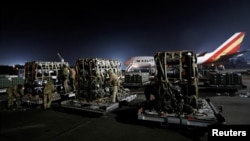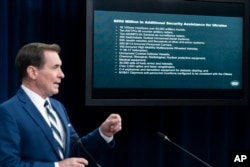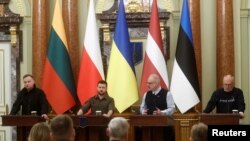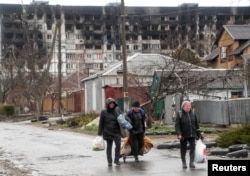The White House on Wednesday reinforced President Joe Biden's surprise statement Tuesday that Russian President Vladimir Putin may be committing genocide in Ukraine.
Biden also announced that Washington is sending another $800 million in weapons, ammunition and other assistance to Ukraine.
"The president was speaking to what we all see, what he feels is clear as day in terms of the atrocities happening on the ground," White House press secretary Jen Psaki said of the genocide remark.
"As he also noted yesterday, of course there will be a legal process that plays out in the courtroom, but he was speaking to what he sees, has seen on the ground, what we've all seen in terms of the atrocities on the ground."
She added, "Regardless of what you call it, what our objective now is — as evidenced by the enormous package of military assistance we put out today — is to continue to help and assist the Ukrainians in this war, one where we see atrocities happening every single day."
But Kremlin spokesman Dmitry Peskov rejected Biden's description, saying, "We consider this kind of effort to distort the situation unacceptable. This is hardly acceptable from a president of the United States, a country that has committed well-known crimes in recent times."
Biden told Ukrainian President Volodymyr Zelenskyy of the new shipment in an hourlong phone conversation on Wednesday. He later said in a statement, "The Ukrainian military has used the weapons we are providing to devastating effect. The United States will continue to provide Ukraine with the capabilities to defend itself."
New weapons, renewed Russian push
The Pentagon said the new tranche of weaponry includes 500 Javelin missiles, 300 Switchblade drones, 300 armored vehicles, 11 helicopters, chemical, biological and nuclear protective gear, and 30,000 sets of body armor and helmets.
The U.S. is also providing an unknown quantity of anti-personnel mines, which are configured to be only manually detonated.
Pentagon press secretary John Kirby said U.S. defense officials want to deliver this equipment while Russia is regrouping its forces, including helicopters and artillery systems, in Belarus.
"They're not fully up to readiness for this renewed push for they want to put in the Donbas," he said. "We recognize that, and we're taking advantage of every day, every hour to get this stuff there as fast as we can. ... We have a good sense of Russian efforts to resupply and reinforce."
Biden's agreement to send more weapons to Ukraine, along with additional helicopters, came after a video appeal from Zelenskyy.
"Freedom must be armed better than tyranny," the Ukrainian leader said. "Without additional weapons, this will turn into an endless bloodbath that will spread misery, suffering and destruction."
Biden said the Western supply of arms to Ukraine "has been critical in sustaining its fight against the Russian invasion. It has helped ensure that Putin failed in his initial war aims to conquer and control Ukraine. We cannot rest now."
Also Wednesday, the presidents of Poland, Lithuania, Latvia and Estonia — all NATO countries bordering Russia — visited Kyiv to show support for Ukraine a day after Putin vowed to continue Moscow's offensive against Ukraine until its "full completion."
The leaders of the four countries, all worried that Russia could attack them if Ukraine were to fall, traveled by train to the Ukrainian capital to meet with Zelenskyy.
While failing to capture Kyiv and much of Ukraine, Russian forces have bombarded numerous cities, killed thousands of Ukrainian civilians and destroyed housing and hospitals.
United Nations humanitarian chief Martin Griffiths recently went to Moscow and Kyiv to seek a cease-fire. But U.N. Secretary-General Antonio Guterres told reporters Wednesday it does not look like that is possible right now.
However, Guterres said there are "a number of proposals that were made, and we are waiting for an answer from the Russian Federation in relation to those proposals — including different mechanisms for local cease-fires, for corridors, for humanitarian assistance, evacuations and different other aspects that can minimize the dramatic impact on civilians that we are witnessing."
Guterres said the U.N. also proposed the creation of a mechanism involving Russia, Ukraine, the U.N. and potentially other humanitarian entities, to help guarantee the evacuation of civilians from areas where fighting is going on and to guarantee humanitarian access.
Presidents visit Kyiv
Lithuanian President Gitanas Nauseda said the European leaders visiting Ukraine planned to deliver "a strong message of political support and military assistance."
Nauseda, Estonian President Alar Karis, Poland's Andrzej Duda and Egils Levits of Latvia also planned to discuss investigations into alleged Russian war crimes, including the massacre of civilians.
Putin has denied Russia has committed atrocities against Ukraine and said it "had no other choice" but to invade Ukraine to protect Russian-speaking people in eastern Ukraine and to "ensure Russia's own security."
He vowed Russia would "continue (its offensive) until its full completion and the fulfillment of the tasks that have been set," although he did not elaborate on his end goals.
One key goal for Russia in eastern Ukraine is to take over Mariupol, a Sea of Azov port where Ukraine says thousands of residents have been killed during weeks of Russian attacks.
Russian Defense Ministry spokesman Major General Igor Konashenkov said 1,026 troops from the Ukrainian 36th Marine Brigade had surrendered at a metals factory in the city. But it was unclear when it purportedly occurred or how many forces were still defending Mariupol.
Ukraine said it is investigating a claim that a drone dropped a poisonous substance on the city, although there were no serious injuries reported. Ukrainian Deputy Defense Minister Hanna Maliar said it was possible that phosphorus munitions had been used in Mariupol.
VOA's Carla Babb and Jeff Seldin contributed to this report. Some information for this report came from The Associated Press, Agence France-Presse and Reuters.



